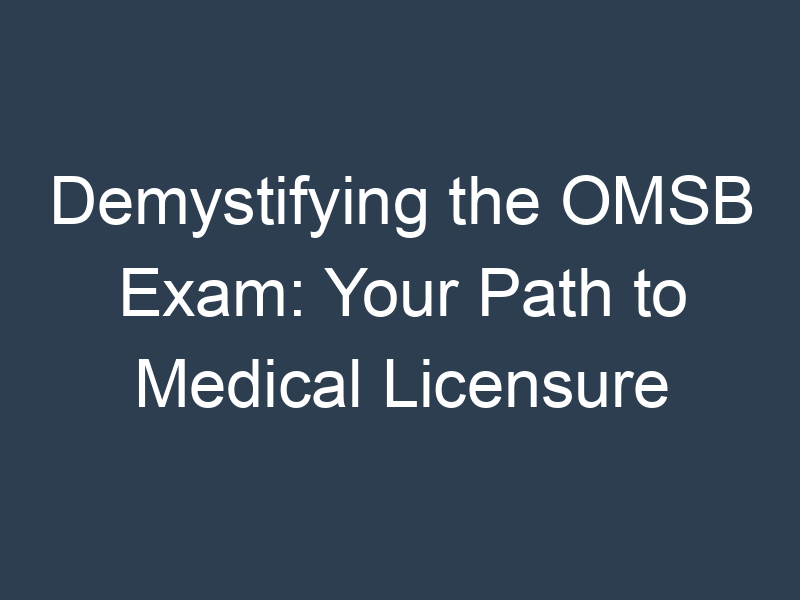Demystifying the OMSB Exam: Your Path to Medical Licensure
The Oman Medical Specialty Board (OMSB) plays a crucial role in ensuring that medical professionals in Oman meet the highest standards of competence and proficiency. To attain a medical license in Oman, healthcare practitioners must successfully navigate the rigorous OMSB Exam. This examination is designed to assess the knowledge, skills, and clinical judgment of medical professionals in their respective specialties. In this comprehensive blog, we will shed light on the OMSB Exam, explain its significance, and provide you with a glimpse of sample questions to guide your preparation.
Understanding the OMSB Exam
The OMSB Exam is a comprehensive assessment conducted by the Oman Medical Specialty Board, covering various medical specialties and subspecialties. Its primary objectives are as follows:
- Evaluation of Competence: The OMSB Exam assesses the competence of healthcare professionals, ensuring that they possess the knowledge and skills necessary to practice medicine in Oman.
- Standardization of Specialty Training: The exam helps standardize the training and knowledge base of medical professionals across different specialties, thereby enhancing the quality of healthcare in Oman.
- Eligibility for Licensure: Successful completion of the OMSB Exam is a prerequisite for obtaining a medical license in Oman, allowing healthcare practitioners to legally practice medicine in the country.
Key Features of the OMSB Exam:
- Specialty-Specific: The OMSB Exam is specialized, with content tailored to specific medical specialties, including internal medicine, surgery, pediatrics, radiology, obstetrics and gynecology, and many more.
- Multiple Formats: The exam may include multiple-choice questions (MCQs), clinical case scenarios, oral examinations, and practical assessments. The format varies depending on the specialty.
- Passing Score: Candidates must achieve a passing score to obtain their medical license, and the minimum passing score is set by the OMSB for each specialty.
- High-Stakes: The OMSB Exam is high-stakes, as the successful completion of the exam is required to practice as a specialist in Oman. The difficulty level of the exam reflects the high standards set by the OMSB.
Sample OMSB Exam Questions
To give you a better understanding of the types of questions you may encounter in the OMSB Exam, here are some sample questions:
Sample Question for Internal Medicine:
Question: A 45-year-old patient presents with acute chest pain and shortness of breath. The pain is retrosternal, radiating to the left arm, and is associated with diaphoresis. What is the most likely diagnosis, and what is the initial management?
a) Myocardial infarction; administer aspirin and call for cardiology consultation.
- b) Pulmonary embolism; start anticoagulation therapy.
- c) Stable angina; provide reassurance and outpatient cardiology follow-up.
- d) Gastric reflux; prescribe antacids and recommend dietary changes.
Sample Question for Surgery:
Question: A 30-year-old patient with a history of cholelithiasis presents with severe right upper quadrant pain, fever, and jaundice. Physical examination reveals right upper quadrant tenderness and a positive Murphy’s sign. What is the most likely diagnosis, and what is the treatment of choice?
a) Acute pancreatitis; supportive care and nil per os (NPO) status.
- b) Cholangitis; urgent endoscopic retrograde cholangiopancreatography (ERCP).
- c) Chronic cholecystitis; elective cholecystectomy.
- d) Gastric ulcer; proton pump inhibitors and dietary modifications.
Sample Question for Pediatrics:
Question: A 2-month-old infant presents with a history of poor feeding, vomiting, and failure to thrive. Physical examination reveals a “olive-sized” mass in the upper abdomen. What is the most likely diagnosis, and what is the recommended intervention?
a) Gastroesophageal reflux disease (GERD); proton pump inhibitors and dietary changes.
- b) Intussusception; perform air enema reduction.
- c) Pyloric stenosis; surgical pyloromyotomy.
- d) Malrotation and volvulus; emergent laparotomy.
Sample Question for Radiology:
Question: A 55-year-old patient with a history of smoking presents with a persistent cough and hemoptysis. A chest X-ray reveals a solitary, well-defined mass in the right upper lobe of the lung. What is the most likely diagnosis, and what is the next step in management?
a) Pneumonia; initiate antibiotics.
- b) Pulmonary tuberculosis; start anti-tuberculous therapy.
- c) Lung cancer; order a computed tomography (CT) scan for further evaluation.
- d) Pulmonary embolism; perform a ventilation-perfusion (V/Q) scan.
Sample Question for Obstetrics and Gynecology:
Question: A 28-year-old woman presents with irregular menstrual cycles, hirsutism, and acne. On examination, she has signs of acanthosis nigricans. What is the most likely diagnosis, and what is the initial treatment approach?
a) Polycystic ovarian syndrome (PCOS); lifestyle modifications and oral contraceptives.
- b) Primary ovarian insufficiency (POI); hormone replacement therapy.
- c) Uterine fibroids; myomectomy.
- d) Endometrial cancer; total abdominal hysterectomy.
Tips for Successful OMSB Exam Preparation
Preparing for the OMSB Exam requires dedication and a well-thought-out study plan. Here are some tips to help you prepare effectively:
- Review Exam Content: Familiarize yourself with the content outline specific to your specialty. Understanding what will be covered is the first step in effective preparation.
- Utilize Official Resources: OMSB offers official study materials and guidelines that are tailored to the exam. Utilize these resources to ensure you’re focusing on the right topics.
- Practice Regularly: Solve practice questions and take mock exams to get a feel for the exam format and assess your knowledge and readiness.
- Manage Your Time: Allocate your time wisely during the actual exam to ensure you answer all questions within the given time frame.
- Seek Professional Guidance: Consider enrolling in review courses or seeking the guidance of experienced instructors who can provide valuable insights and study strategies.
- Stay Calm and Confident: On the day of the exam, stay calm and confident. Carefully read and understand each question before selecting your answers.
The OMSB Exam Questions is a significant milestone for healthcare professionals seeking to practice medicine in Oman. It is designed to assess your competence and proficiency in your chosen medical specialty, and successful completion of the exam is a requirement for obtaining a medical license in Oman. By understanding the exam’s format, content, and preparing diligently with the help of official resources, practice questions, and a focused study plan, you can increase your chances of success. Passing the OMSB Exam is a commendable achievement that opens the door to a fulfilling career in Oman’s healthcare sector, where your expertise and skills will make a positive impact on the lives of patients. Best of luck with your preparations and the upcoming OMSB Exam!







